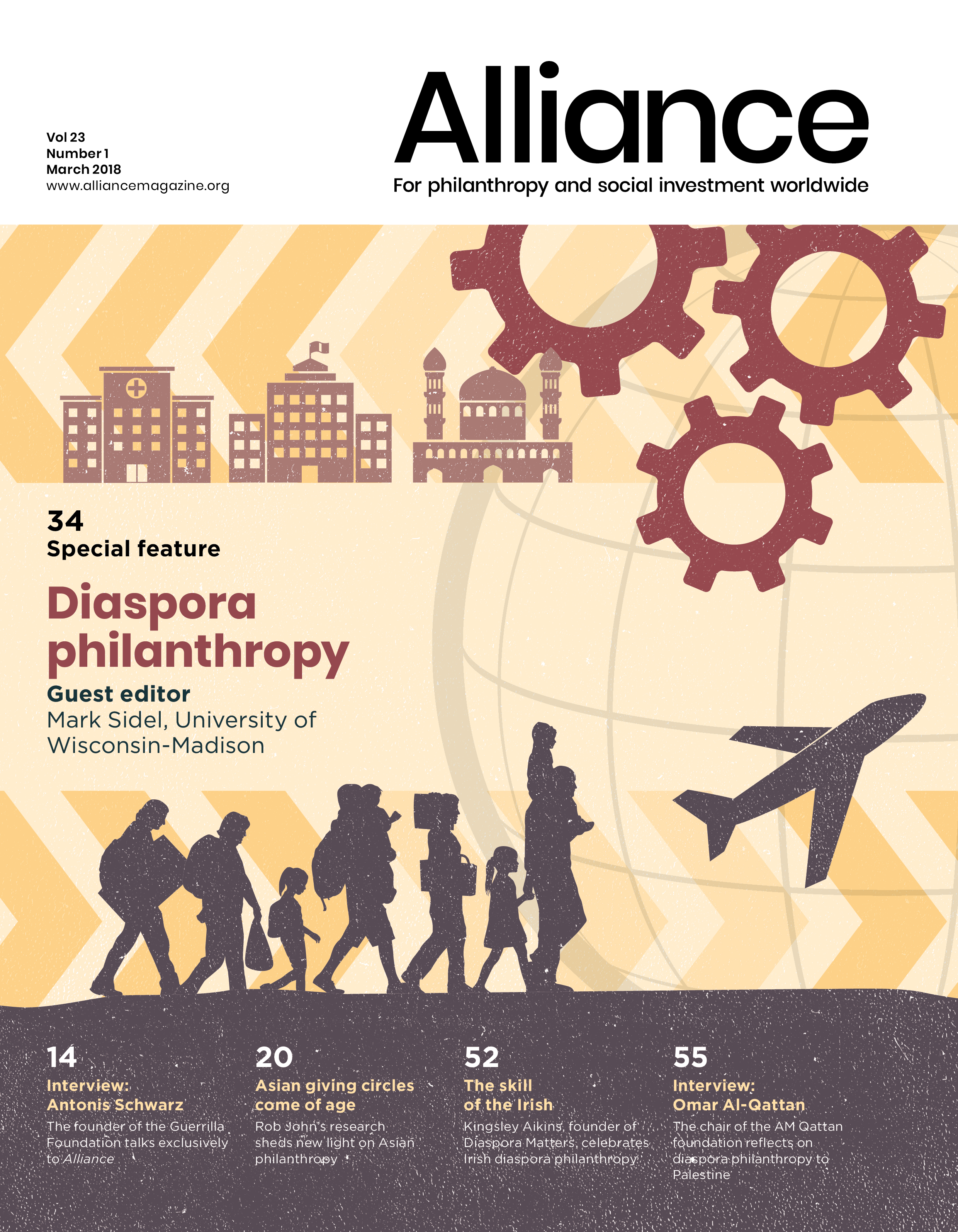What do we mean by scaling up interventions? The Alliance website uses the following definition: ‘The ability to expand programmes, projects or ideas in collaboration with other foundations and/or government, business and civil society.’ The examples below give a flavour of the variety of aims and approaches.
Tackling disease at scale
The Gates Foundation has a long history of supporting collaborative models to combat disease at scale.
In 1999, it provided $750 million to launch Gavi, the Vaccine Alliance, which also involves Unicef, the World Health Organisation and the World Bank, and whose aim is to improve ‘access to new and underused vaccines for children living in the world’s poorest countries’.
The foundation has also been at the forefront of efforts to combat malaria, again often in conjunction with governments, multilateral funders and research institutes. As a result of these efforts, the death rate from malaria in sub-Saharan Africa has fallen by 57 per cent since 2000.
In January last year, the foundation announced a partnership with the British government to try and eradicate the disease altogether, to which it has committed more than $4 billion over the next five years.
The partnership will look particularly at emerging difficulties to overcoming the disease, such as drug-resistant strains. 156
For more, visit https://tinyurl.com/GatesFoundation-Malaria
 Skills-based learning across Brazil
Skills-based learning across Brazil
Porticus manages the philanthropic programmes of charitable entities established by the Netherlands-based Brenninkmeijer family (the founders of clothing retailer C&A).
Since 2009, it has been facilitating a programme called Com.Domínio Digital, an educational initiative in Brazil run by Instituto Aliança.
Outdated teaching methods have resulted in high levels of truancy and drop-out rates in Brazilian secondary schools.
In order to tackle this, Com.Domínio Digital was devised to run alongside the school curriculum to equip young people with the personal and social skills to enter the labour market, teaching students valuable skills such as researching, decision-making, problem-solving and planning.
Around 64 per cent of the 29,000 young people who have been through the scheme have found jobs.
The success of the programme has led to its official incorporation in the educational system of Ceará state by SEDUC (the state Department of Education), with Porticus in support.
For more, visit http://www.porticus.com/en/home
Groundwater and sanitation programmes in India
Set up in 2005 by Indian philanthropist, Rohini Nilekani, Arghyam funds organizations that implement and manage groundwater and sanitation programmes in India.
In addition to making grants in 22 states throughout India, the foundation seeks to widen the scope of its work in collaboration with local and national governments on research and awareness-raising campaigns, cooperating, for instance, with the government of Karnataka in a campaign to create demand for improved sanitation in the state’s rural areas.
The campaign involved Arghyam, the state and district governments, the Public Affairs Foundation and Centre of Gravity, a professional communications firm.
It was rolled out in 119 villages and resulted in a 31.4 per cent increase in toilets built in the villages on which the campaign focused, compared with 9.5 per cent in the ‘control’ villages.
For more, visit http://arghyam.org/about-us
Tackling deforestation
Concerned at the effects of deforestation on greenhouse gas emissions and seeing the scale at which any response would need to operate, the Packard Foundation helped to set up the Climate and Land Use Alliance (CLUA) in collaboration with ClimateWorks, the Ford Foundation and the Gordon and Betty Moore Foundation in 2009.
The consortium focuses on regions where the challenges – and therefore the potential gains – are greatest: Brazil, Indonesia, the US, Mexico and Central America.
In Indonesia, CLUA devised a strategy to reduce greenhouse gas emissions from palm oil production, while its work with the Brazilian and Indonesian governments has helped establish goals to reduce greenhouse gas emissions.
In Mexico, CLUA’s work helped establish the Mesoamerican Alliance of Peoples and Forests, which empowers indigenous communities in forest regions. In the US, it has worked to safeguard the Lacey Act, which prohibits the sale of illegally sourced wood products.
For more, visit https://tinyurl.com/PackardCLUA
Incubating businesses in low-income areas
Founded in India in 2001, Villgro incubates early-stage, innovative businesses, often in the health and education sectors, providing seed funding, hi-touch mentoring with an experienced senior adviser and networking.
Since 2001, it has helped 119 entrepreneurs create more than 4,000 jobs and has secured $14 million in follow-on funding.
The Indian model offers funding from $10,000 to $250,000 for social start-up development.
The model has been successfully exported to Vietnam, the Philippines and, in February last year, its expansion into Kenya was announced, with the launch of an incubator for early-stage businesses in the healthcare and life sciences sector in Nairobi in partnership with USAID’s Partnering to Accelerate Entrepreneurship (PACE) initiative.
For more, visit http://villgro.org
And enter Co-Impact…
Towards the end of last year, foundations and philanthropists including the Rockefeller Foundation, Richard Chandler, Bill and Melinda Gates, Jeff Skoll and Romesh and Kathy Wadhwani, launched the Co-Impact initiative, a $500 million collaboration to bring ‘large-scale, sustainable change to underserved populations across the developing world in the critical areas of health, education, and economic opportunity’.
The EkStep Foundation, co-founded by Indian philanthropists, Rohini and Nandan Nilekani, will serve as technical partner.
Described by Fortune as a new way for billionaires ‘to give their money away’, Co-Impact promises systems change grants of ‘up to $50 million over several years’ to ‘initiatives with proven leaders and results which are poised to scale even further’.
For more, visit http://www.co-impact.io/.
Andrew Milner is associate editor of Alliance. Email andrew@alliancemagazine.org.







Comments (0)